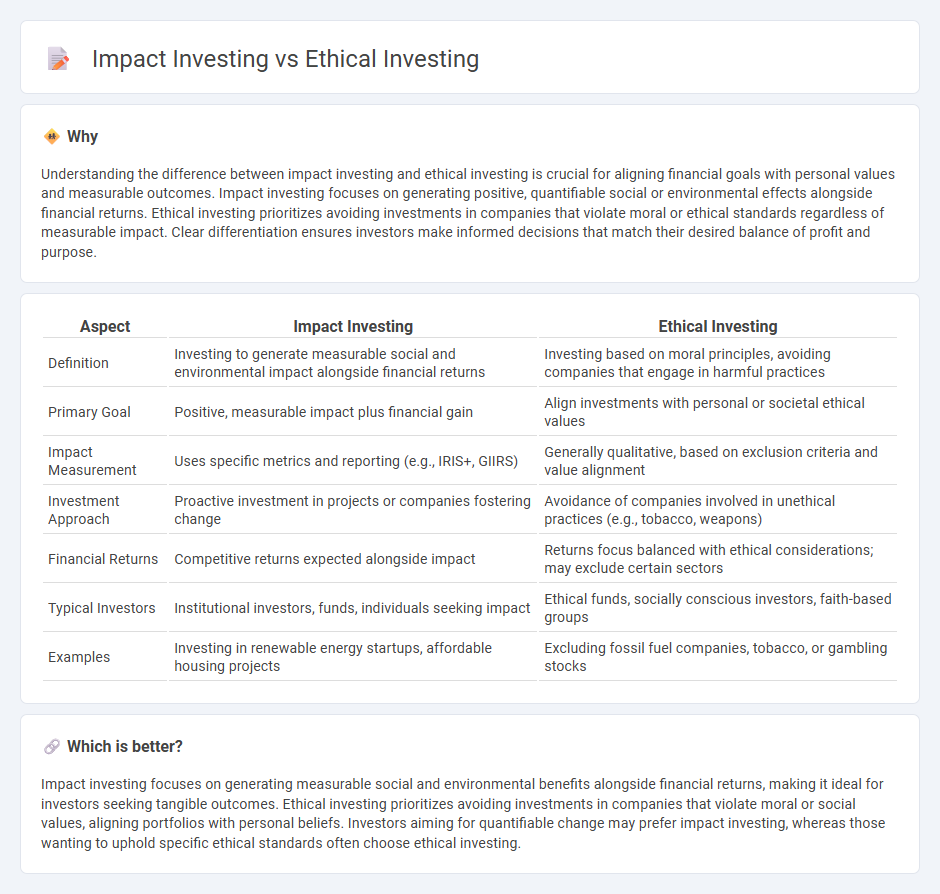
Impact investing focuses on generating measurable social and environmental benefits alongside financial returns, targeting sectors like renewable energy and affordable housing. Ethical investing avoids companies involved in activities deemed harmful or unethical, such as tobacco, gambling, or fossil fuels, emphasizing moral values in portfolio selection. Explore deeper insights into how these investment strategies align with both financial goals and social responsibility.
Why it is important
Understanding the difference between impact investing and ethical investing is crucial for aligning financial goals with personal values and measurable outcomes. Impact investing focuses on generating positive, quantifiable social or environmental effects alongside financial returns. Ethical investing prioritizes avoiding investments in companies that violate moral or ethical standards regardless of measurable impact. Clear differentiation ensures investors make informed decisions that match their desired balance of profit and purpose.
Comparison Table
| Aspect | Impact Investing | Ethical Investing |
|---|---|---|
| Definition | Investing to generate measurable social and environmental impact alongside financial returns | Investing based on moral principles, avoiding companies that engage in harmful practices |
| Primary Goal | Positive, measurable impact plus financial gain | Align investments with personal or societal ethical values |
| Impact Measurement | Uses specific metrics and reporting (e.g., IRIS+, GIIRS) | Generally qualitative, based on exclusion criteria and value alignment |
| Investment Approach | Proactive investment in projects or companies fostering change | Avoidance of companies involved in unethical practices (e.g., tobacco, weapons) |
| Financial Returns | Competitive returns expected alongside impact | Returns focus balanced with ethical considerations; may exclude certain sectors |
| Typical Investors | Institutional investors, funds, individuals seeking impact | Ethical funds, socially conscious investors, faith-based groups |
| Examples | Investing in renewable energy startups, affordable housing projects | Excluding fossil fuel companies, tobacco, or gambling stocks |
Which is better?
Impact investing focuses on generating measurable social and environmental benefits alongside financial returns, making it ideal for investors seeking tangible outcomes. Ethical investing prioritizes avoiding investments in companies that violate moral or social values, aligning portfolios with personal beliefs. Investors aiming for quantifiable change may prefer impact investing, whereas those wanting to uphold specific ethical standards often choose ethical investing.
Connection
Impact investing and ethical investing both prioritize generating positive social and environmental outcomes alongside financial returns. Impact investing actively directs capital to projects with measurable societal benefits, while ethical investing screens investments based on moral values and corporate responsibility criteria. These approaches overlap by aligning portfolios with sustainable development goals and fostering corporate accountability in the financial sector.
Key Terms
ESG (Environmental, Social, and Governance)
Ethical investing emphasizes screening investments based on values such as avoiding companies involved in tobacco or weapons, while impact investing targets measurable positive social and environmental outcomes alongside financial returns. ESG (Environmental, Social, and Governance) criteria serve as a key framework for evaluating corporate behavior across both strategies, influencing risk assessment and long-term sustainability. Explore how integrating ESG factors can refine your investment approach and drive meaningful change.
Negative screening
Negative screening is a common strategy in ethical investing that excludes companies involved in controversial industries like tobacco, weapons, or fossil fuels. Impact investing also considers negative screening but pairs it with proactive investments that generate measurable social or environmental benefits. Explore how these approaches shape investment portfolios and align with your values.
Measurable outcomes
Ethical investing prioritizes screening investments based on values to avoid harm, while impact investing actively seeks measurable social or environmental benefits alongside financial returns. Impact investors use specific metrics and data to quantify outcomes, such as reduced carbon emissions or improved community health, ensuring transparency and accountability. Discover the key differences and how measurable outcomes drive investment strategies.
Source and External Links
Ethical Investing - What It Is and How To Do It - Ethical investing is a strategy where investors prioritize their moral, religious, or social values alongside financial returns, often avoiding companies involved in controversial industries like tobacco, gambling, or firearms.
Ethical Investing Explained - Ethical investing, also known as sustainable or socially responsible investing (SRI), aims to generate financial returns while promoting positive social and environmental outcomes by excluding companies engaged in harmful activities.
Socially responsible investing - Socially responsible investing (SRI) considers financial return alongside ethical, social, or environmental goals, often focusing on environmental stewardship, human rights, and diversity.
 dowidth.com
dowidth.com